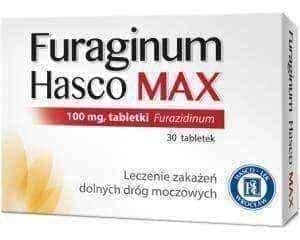Hasco-Lek
Furaginum Hasco Max 0.1g x 30 tablets
Furaginum Hasco Max 0.1g x 30 tablets
Couldn't load pickup availability
Furaginum Hasco Max 0.1g x 30 tablets
- The medicinal product Furaginum Hasco Max 0.1g contains an increased amount of the active substance, i.e. furazidine. Indications for the use of the preparation are bacterial infection of the lower urinary tract. Can be used from the age of 15.
Furaginum Hasco Max Composition:
The active substance is furazidine (Furazidinum). One tablet contains 100 mg of furazidine. The other ingredients are: gelled starch, maize starch, sucrose, anhydrous colloidal silica, stearic acid 50.
Furaginum Hasco Max Action:
The mechanism of action of furazidine contained in the Furaginum Hasco Max 0.1g medicinal product consists in inhibiting the growth of bacteria that are responsible for lower urinary tract infections. Furazindine (otherwise known as furagine) is a derivative of nitrofuran. It is recommended to use nitrofuran derivatives during a meal that contains protein, because it increases its biological availability.
Furaginum Hasco Max Application:
Furaginum Hasco Max 0.1g indicated for use in adults and adolescents over 15 years of age in the treatment of acute and recurrent uncomplicated lower urinary tract infections.
Additional information:
Keep out of reach of children at room temperature. Avoid drinking alcohol while using furazidine. The drug contains sucrose, it is not recommended for people with rare inherited disorders associated with fructose intolerance, malabsorption of glucose-galactose or sucrase-isomaltase deficiency.
Contraindications:
Do not use in case of hypersensitivity to any component of the drug and derivatives of nitrofuran. Do not use in the first trimester of pregnancy, and in the period of pregnancy (from the 38th week) and during delivery (this may increase the risk of haemolytic anemia in the newborn). Do not use in children and adolescents under 15 years of age. Do not use in the case of renal failure (creatinine clearance less than 60ml / min or elevated serum creatinine). Do not use in the case of recognized polyneuropathy (eg diabetic). Do not use in the case of a deficiency of glucose-6-phosphate dehydrogenase.
Side effects:
Some people may experience side effects during treatment. Immune system disorders: rarely - anaphylaxis, angioneurotic edema; unknown frequency - pruritus, urticaria, rash. Blood and lymphatic system disorders: frequency unknown - cyanosis due to methemoglobinemia. In people with a deficiency of glucose-6-phosphate dehydrogenase, the use of furazidine may lead to megaloblastic or haemolytic anemia. Nervous system disorders: common - headache; frequency unknown - dizziness, drowsiness, visual disturbances, peripheral neuropathy, also with acute or irreversible course (especially renal failure, anemia, diabetes, electrolyte disturbances, vitamin B deficiency). Respiratory, thoracic and mediastinal disorders: It is important to recognize the side effect as soon as possible and stop taking the medicine. Impaired lung function may be irreversible. Gastrointestinal disorders: often - nausea, excessive gas discharge; frequency unknown - vomiting, constipation, diarrhea, dyspeptic symptoms, abdominal pain, loss of appetite, salivary gland inflammation, pancreatitis, pseudomembranous enteritis. Hepato-biliary disorders: rarely - symptoms of drug-induced hepatitis, cholestatic jaundice, hepatic parenchymal necrosis (usually during long-term use). Skin and subcutaneous tissue disorders: rarely - exfoliative dermatitis, erythema multiforme, Stevens-Johnson syndrome; frequency unknown - alopecia (transient). General disorders and administration site conditions:
Dosage:
Use as directed by your doctor or as described on the leaflet. The drug for oral use, it should be taken with a meal that contains protein. Dosage for adults and adolescents over 15 years of age: on the first day, use one tablet 4 times a day, in the following days, use one tablet 3 times a day. The treatment lasts 7-10 days. The treatment can be repeated, if necessary after 10-15 days break.
Furaginum Hasco Max 0.1g x 30 tablets
Materials
Materials
Shipping & Returns
Shipping & Returns
Dimensions
Dimensions
Care Instructions
Care Instructions


